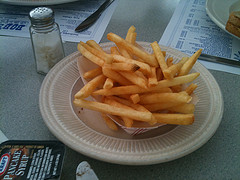 This week, the U.S. Environmental Protection Agency issued Energy Star ratings for large vat commercial fryers. These appliances are used by high-volume dining establishments — like fast food chains, institutional cafeterias and full-service restaurants— to make french fries, hush puppies and anything else Paula Deen would promote, in bulk.
This week, the U.S. Environmental Protection Agency issued Energy Star ratings for large vat commercial fryers. These appliances are used by high-volume dining establishments — like fast food chains, institutional cafeterias and full-service restaurants— to make french fries, hush puppies and anything else Paula Deen would promote, in bulk.
Encouraging the industry to upgrade to more energy-efficient fryers could help reduce the overall environmental (if not health) impact of kitchens in the U.S. catering to the collective appetite for fried foods, an appetite that seems pervasive, and permanent here. One Texan cook, Mark Zable, has even invented a method to make deep-fried beer.
According to a press statement and calculations by the EPA:
” If every large vat fryer in the [country] met the new Energy Star requirements, energy cost savings would increase approximately $81 million per year and reduce annual greenhouse gas emissions equivalent to the emissions from nearly 95,000 cars.”
The lifetime costs and footprint of commercial frying goes beyond the electricity and gas that it takes to run kitchen equipment, of course. Certain vegetable oils are more sustainable than others. Spent grease, and even vegetable oil, can become a pollutant unless disposed of properly.
Many food businesses are opting to give or sell their spent grease to biofuel producers, these days, thankfully.
Bon Appétit Management Company — which provides sustainable food in cafes at SF Giants stadium, eBay, Oracle, Google and college campuses including U-Penn, Duke and MIT — has been doing this for years, in collaboration with local biofuel companies like Kelley Green Biofuel for example.
This month (as Tilde Herrera reported for Greenbiz.com) U.S. Foodservice went so far as to acquire a “grease diesel” company, WVO Industries. The foodservice business will begin to power its truck fleets with their own spent cooking oil, allowing them to avoid the rising costs of gasoline here.
Ultimately, foods that are sautéed, boiled, toasted, roasted or prepared raw will prove better for the body and planet than deep-fried with rare — no pun intended — exception.
There is no official carbon footprint label for food here, but a sustainability blogger and small business owner in Germany, Peter Graf (not to be confused with Peter Graf, chief sustainability officer at SAP) has shared some rough calculations via his blog Ecofriendly-Company.com. He wrote:
“The path from potato to french fry takes 9 steps.The potatoes are…
1. Steamed and peeled,
2. Cut
3. Blanched
4. Dried
5. Par-fried
6. Cooled
7. Frozen
8. Transported
9. Stored frozenThen, they’re fried in hot oil in the canteen and served. All this transforms a single kilo of potatoes (140g CO2) into a real climate-killer (5700g CO2).”
Photo courtesy Brandi Jordan (CC-2.0)